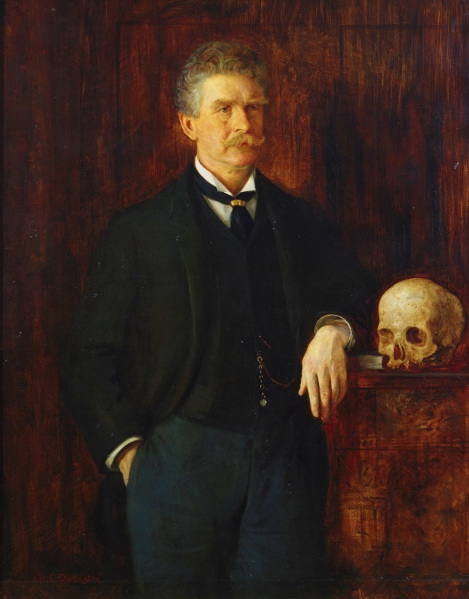
The devil’s lexicographer is Ambrose Bierce (1842–1914?), the author remembered for his compilation of satirical definitions, The Devil’s Dictionary (1911). The devil’s chaplain is Charles Darwin, who in a 1856 letter to Hooker, exclaimed, “What a book a Devil’s chaplain might write on the clumsy, wasteful, blundering low & horridly cruel works of nature!”. The task at hand is examining what the former said about the latter in the spirit of Thomas F. Glick’s What about Darwin? (2010). But, as I noted in part 1, although Bierce announced early in his career that his program was “calm disapproval of human institutions in general…enthusiastic belief in the Darwinian theory, intolerance of intolerance, and war upon every man with a mission,” he seems not to have attempted to discuss Darwin seriously at any length. His references to Darwin are mainly facetious.
A lot of these references occur in the context of ironic takes on human evolution. In The Fiend’s Delight (1874), published under the pseudonym Dod Grile, Bierce wrote, “Those who are horrified at Mr. Darwin’s theory, may comfort themselves with the assurance that, if we are descended from the ape, we have not descended so far as to preclude all hope of return.” The epigram is retooled for the worse in his collected works as “Persons who are horrified by what they believe to be Darwin’s theory of the descent of Man from the Ape may find comfort in the hope of his return.” The Devil’s Dictionary defines “descent” as “Going lower,” adding, “Popularly used to indicate the existing generation is a peg worse than that which fathered it. Thus one Darwin justly discourses upon the superiority of the ancestral baboon in a melancholy essay, called ‘The Descent of Man.’”
In a piece on the “Decadence of the American Foot,” perhaps indebted to Charles Bell’s treatise of natural theology The Hand (1833), Bierce suggests, on the one hand (if you will), that religion affirms that “its arched step, its inflexible toes, its padded sole, and the other peculiarities of its intricate construction” are “proof positive of intelligent design [!], and therefore of an intelligent Designer,” while on the other hand, that “[s]cience coldly replies to pointing to the serviceable foot of the bear, which lacks the arched instep, and of the horse, which is without the flexible toes, or toes of any kind, and in which no use is made of the padded sole.” He then submits a compromise: “The human foot as we have it was designed by an intelligent Power in order to fit mankind for an arboreal future.” The solution “leaves the Christian his Adam, the Darwinian his Ape.”
The best mention of Darwin in Bierce that I found, though, reveals a concern for the proper statement of genealogical relationships in human evolution that is highly simpatico to NCSE (see, e.g., Eric Meikle and Eugenie C. Scott’s “Why Are There Still Monkeys?”). Evidently addressing a defender of the Darwinian theory, Bierce writes:
The editor of the Barnacle has a hobby which he has ridden for a number of years, to the perfect satisfaction of his readers and the unspeakable delight of ourselves. That hobby—now somewhat sore in the back—is the Darwinian theory. How much the rider knows about his horse will be seen from the following, upon the freedom of thought: “One man is not to be deterred from advocating the Darwinian theory because his neighbor is shocked at the idea that man is a development of the monkey.” Very true, but he ought to be debarred from advocating it if he shocks his neighbor at his utter ignorance of what it really is. The Darwinian theory, James, does not imply that man is “a development of the monkey,” but that both are descended from a common parent. See the difference? (emphasis in original)
Bierce continues, “Your error is the same as if you should claim to be the offspring of a mule, instead of admitting the ass is the father of both the mule and yourself. In the one case you would assert a physical impossibility, in the other you would simply support an extremely probable hypothesis.” He never could resist descending to the ad hominem.

